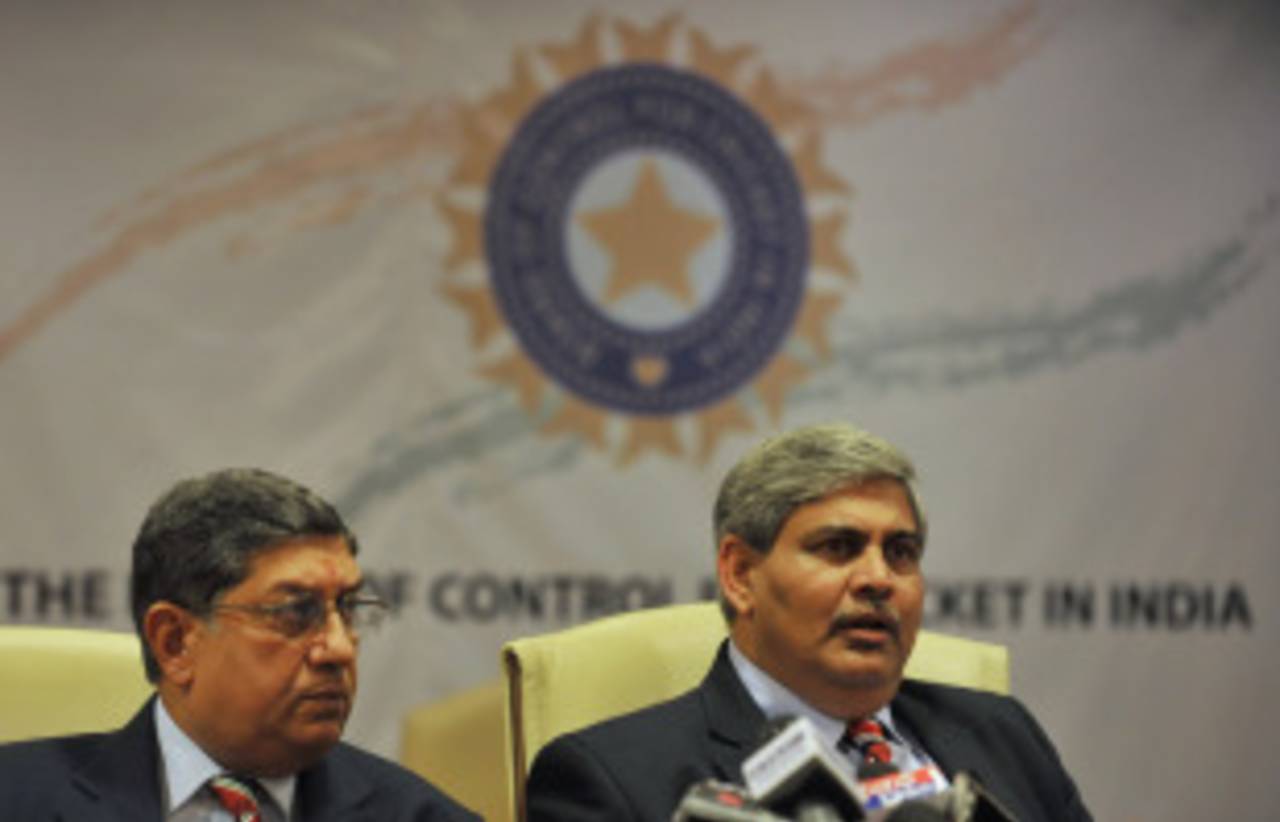BCCI under scrutiny for alleged foreign exchange violations
There is bad news in store for the BCCI: it has been issued 14 notices, carrying a total penalty of Rs 1546 crore (approx US$291m) for violations of the Foreign Exchange Management Act
Jasvinder Sidhu
05-May-2013

Current BCCI president N Srinivasan and his predecessor Shashank Manohar are among the officials mentioned in the show cause notices • AFP
Sometime over the next couple of days an appellate tribunal is set to hear the BCCI's appeal against a Rs 52.24 crore ($10m) fine levied in February by the Competition Commission of India (CCI) for irregularities in the grant of IPL franchise rights, media rights and sponsorship rights. That fine was part of a series of financial penalties imposed by the federal government as part of a multi-department focus on the BCCI and its allied businesses; it included a Rs 2300 crore (US$433m) income tax bill covering a three-year period and a Rs 100 crore ($18.77m) penalty demanded of Rajasthan Royals.
However, investigations by ESPNcricinfo reveal that there is more bad news in store for the BCCI: it has been issued 14 notices similar to that received by Rajasthan Royals, carrying a total penalty of Rs 1546 crore (approx US$291m) for violations of the Foreign Exchange Management Act (FEMA). All the notices have been issued by the Indian Enforcement Directorate (ED).
The matter is currently the subject of "quasi-judicial adjudication proceedings", which are in progress before the Special Director of Enforcement, Mumbai. Because of those proceedings the BCCI - unlike Rajasthan Royals - is yet to be issued an ED order demanding payment.
Despite the presence of several politicians in the BCCI, the board has a very prickly relationship with the Indian government. While it does have time on its side, given India's lengthy judicial process, the fact that there are now legal proceedings underway in a plethora of cases accusing the BCCI of financial violations indicates that the chances of it coming away unscathed in all of them appear extremely unlikely.
In 2011, after two years of investigations, the ED issued 20 notices relating to various transgressions by the IPL - 14 to the BCCI, and the rest to Rajasthan Royals and officials of the State Bank of Travancore's Jaipur Branch.
The officials mentioned in the show cause notices - detailed in a memorandum, a copy of which is with ESPNcricinfo - include current BCCI president N Srinivasan, his predecessor Shashank Manohar, former IPL chairman Lalit Modi, former BCCI treasurer MP Pandove, its general manager Ratnakar Shetty, the IPL's chief operating officer Sundar Raman, and Prasanna Kannan, who has been identified as "manager BCCI".
The 14 notices pertain to the IPL's 2009 season, when the tournament was moved to South Africa. The league was then run by Modi and the IPL's governing council had little control over his actions as a "chairman". Most notices pertain to Sections 3, 4 and 5 of the FEMA law, covering foreign exchange transactions both within and outside of the country.
The most significant of these relate to remittances made by and to the BCCI during IPL 2009: two each for Rs 243 crore (US$49m) and Rs 203 crore (US$38m) have been issued for contraventions of the FEMA law. The contraventions in these four cases pertain to receiving payment from outside India and holding foreign exchange outside India beyond the provisions of FEMA.
According to Harish Pandey, a senior lawyer specialising in FEMA law in the Supreme Court of India, quasi-judicial adjudication marked a "crucial and serious stage for the BCCI, as it has to state everything in its defence here".
According to lawyers familiar in their dealings with FEMA cases, it should take around two years for a quasi-judicial hearing to reach a decision. These hearings are the first of four stages of legal proceedings relating to being served an ED notice, which could go all the way to the Supreme Court. Once the ED issues its order demanding payment, the defendant has 45 days to appeal to a Special Director (Appeals) and from there to an Appellate Tribunal. An unfavourable decision there means the defendant can move the High Court and finally the Supreme Court.
A BCCI insider, on the condition of anonymity, said the issue will run its due course: "It could take years and years for the case to close. Right now, the ED is investigating it. If they have enough evidence, it will move to court. And then, you never know how long will it take for the legal proceedings."
A finance ministry official said the various levels of appeal ensured justice: "At four appellate stages you can't not find justice. If you are innocent, there are checks and balances to see that justice is done. If you are guilty, you will be caught. Ultimately, redressal is available if your case is strong."
Jasvinder Sidhu is a freelance journalist based in New Delhi